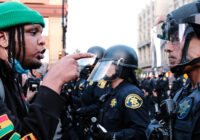As long as people deny others the right to choose when it comes to race, they continue to dance to a tune composed by those who had a vested interest in demarcating by skin color.
Anthony Ekundayo Lennon is a rarity — a man who is publicly denounced for saying he’s black. Last year, he was awarded a “theatre practitioner of colour” traineeship worth over £400,000 ($520,000) from Arts Council England. Ekundayo Lennon’s application for the award bore the self-description “mixed heritage” (a term the British prefer to what Americans call biracial). He was born to Irish parents, both of whom self-identify as white.
The aim of the award was to help him “deliver a comprehensive programme of talent development for future Bame leaders.” BAME is what Brits use as the acronym for Black, Asian and Ethnic Minority. But the project has gone desperately wrong; instead of interpreting Ekundayo Lennon’s career path as his choice, critics have accused him of deception.
In assenting to be treated as a black person, he has, like the American Rachel Dolezal, trespassed into a taboo area. Dolezal, formerly an executive of America’s National Association for the Advancement of Colored People (NAACP) was a cause célèbre when her parents announced that they both identified as white and considered her similarly. She’d identified as black since her college days and saw no problem with this. “Race is a social construct, even if we don’t want it to be,” she told Patt Morrison, of the Los Angeles Times, in 2017. She has a point: If blackness is recognized as a signifier, or physical expression, of “race,” then whoever does the recognizing either accepts categories proposed by racists or understands both as “social constructs.”
Racist Trap
Those who criticize Ekundayo Lennon and Dolezal fall into a trap laid by racists 400 years ago when they invented “white.” Yes, invented. In his The Shaping of Black America, Lerone Bennett wrote: “The first white colonists had no concept of themselves as white men … The word white, with all its burden of guilt and arrogance, did not come into common usage until the latter part of the [17th] century.” White servitude was a precursor to the exploitation of blacks; America’s colonial population consisted largely of a great mass of white and black bondsmen (indentured servants), who occupied roughly the same economic plateau and were treated with equal disdain by the lords of the plantations.
Theodore W. Allen, in his book The Invention of the White Race, pays particular attention to the experiences of migrant Irish, once disparaged as degenerate and not amenable to civilizing influences, yet later transformed into defenders of an exploitative order. The Irish were sneered at by English colonizers as an inferior racial group (colonization of Ireland took place through the 16th century), but were physically indistinct from the English. There were other groups that would today be recognized as white that were readily associated with savagery. But it became expedient to co-opt them as the prospect of slave rebellions surfaced.
So, if the so-called white race was an invention, how did blacks come into being? Emerging in the 1960s, the Black Power movement supported rights and political power for the part of the American population that had been called over the years “Negroes” or “colored,” as well as many other derogatory names. For two years from 1965, there were uprisings in practically every American city where there was a black population. The violence started in the Watts neighborhood of Los Angeles and eventually subsided in Detroit.
In 1966, a militant political organization called the Black Panthers grew out of Oakland, California. James Brown’s classic funk track “Say It Loud – I’m Black and I’m Proud” was released in 1968. It wasn’t exactly poetry, but it expressed the developing mood and idiom of the times. In this context, black people used black as a form of vengeance: In some eras, racists had used it as an expletive, as in “You black …” and whatever noun came into their heads. So, in a sense, it offered itself as a word that turned meaning inside out. “Black is beautiful” was one of the sayings of the period — this wasn’t just a pronouncement; it was advice on how to think about yourself.
In 1971, the Congressional Black Caucus provided a kind of official stamp of approval for the word. There might have been uncertainty about whether whites were entitled to use it, but that soon clarified. By the mid-1970s, it was the only respectful way to refer to people of African heritage. The term “African-American” didn’t gain any traction in the popular lexicon until the 1980s. Black was no more a description of skin color than white. It could be argued that one was a sarcastic response to the other.
History and exposition are often handy correctives. But they seem to have been drowned out by the deafening screech of abuse against Ekundayo Lennon and anyone else who self-identifies as black, but whose lineal descent has no tie to Africa. It took the best part of a century before British colonizers created the inclusive white label (the first British slave settlement was established in Jamestown, Virginia, in 1607) and another 360 before black came into being — at least in the way we understand and use it now. And nearly a half-century after that, people have either forgotten or never knew both terms are human artifices, not natural qualities. Otherwise they might have another objection to Ekundayo Lennon’s venture.
Continuing Narrative
Being black means belonging to a struggle that has been incubating for over four centuries and forms an indelible part of human history. It involves the enslavement, exploitation and oppression of about 12 million Africans and their offspring and, over time, the successive generations of people who have endured persecution, lynching and brutality. Were this consigned to history, the inglorious episode would be terrible enough. But the narrative continues in different guises to the present day, with the descendants of slaves habitually mistreated. The bedeviling practice of racism continues to motivate and justify the mistreatment of black people, and identifying as black implicates a person in a daily conflict.
Has Ekundayo Lennon or, for matter, Dolezal, been part of this conflict? No one actually asked the question, but I conjecture this is what was on people’s minds when they objected to Ekundayo Lennon’s self-description as black. Something similar might have been on Germaine Greer’s mind when she made her remark about trans women, saying that “Just because you lop off your dick and then wear a dress doesn’t make you a fucking woman.” She was alluding to women’s history of being denied the right to own property, vote, keep their own income, be educated, serve in the military and in politics, or participate in dozens of other pursuits that men have controlled. Put another way, have transgender people and those opting to switch ethnic status paid their dues?
Those who choose to liberate their inner selves escape the prison of their natal bodies, face up to their true sexual identities and, in the process, challenge the traditional binary, are typically praised. Caitlyn Jenner, for example, was in 1976 an Olympic gold medalist in the men’s decathlon and in 2015 announced that she was a trans woman. Asked about her sexuality, Jenner, who has three children from three marriages, described herself as heterosexual. There was, it seemed, something almost superhumanly valiant about her transformation. Contrast this with the case of Michael Jackson: Though his autopsy confirmed he suffered from vitiligo — a skin condition in which the pigment is lost from areas of the skin, causing whitish patches — the popular theory was that he was anguished by his dark skin and sought to lighten it. The plastic surgery procedures he elected to undergo added substance to this, of course.
Jackson was among many African-Americans who have been rebuked for even giving the impression they’d tried to conceal or expunge their skin color. Beyoncé, Kerry Washington and Azealia Banks are among the many others. Fernando Montano, the Royal Ballet star, who was born in Colombia, recently disclosed that, in his early years with the ballet company (he joined in 2006), he used lightening makeup: “I was trying to fit in, and so I used to put on light make-up, on my hands and face, so I could look like the others and blend in.” The usual outcry was muted, more a recognition that some assimilation was probably necessary to his survival in a sphere dominated by whites. Ekundayo Lennon though appeared to be trying to transfigure contrarily.
The 2000s are supposed to be the century of fluidity. Some people who attempt self-reinvention are typically admired for their courage, steadfastness and determination to pursue what they regard as their rightful status, especially sexual status. The denomination “trans” has been stripped of its historical stigma and any vestiges of negativity. But the kind of respect afforded those who try to convert their body, either hormonally or surgically because of unease or dissatisfaction with their birth sex, contrasts dramatically with the condemnation that often greets people who even seem to want to change ethnicity.
The trans debate was disorienting enough. That’s why shocks are so useful — they force us to think and make choices. Fitfully, we’ve come to recognize that some people are just more comfortable with a sexual identity that frees rather than incarcerates them. But, when it comes to ethnicity, there appears little or no room for maneuver. As long as people deny others the right to affiliate as they wish, they continue to dance to a tune composed by those who had a vested interest in demarcating by skin color. A world without racism will be a world without whites — or blacks.
*[Ellis Cashmore’s Kardashian Kulture will be published in February 2019.]
The views expressed in this article are the author’s own and do not necessarily reflect Fair Observer’s editorial policy.
Support Fair Observer
We rely on your support for our independence, diversity and quality.
For more than 10 years, Fair Observer has been free, fair and independent. No billionaire owns us, no advertisers control us. We are a reader-supported nonprofit. Unlike many other publications, we keep our content free for readers regardless of where they live or whether they can afford to pay. We have no paywalls and no ads.
In the post-truth era of fake news, echo chambers and filter bubbles, we publish a plurality of perspectives from around the world. Anyone can publish with us, but everyone goes through a rigorous editorial process. So, you get fact-checked, well-reasoned content instead of noise.
We publish 3,000+ voices from 90+ countries. We also conduct education and training programs
on subjects ranging from digital media and journalism to writing and critical thinking. This
doesn’t come cheap. Servers, editors, trainers and web developers cost
money.
Please consider supporting us on a regular basis as a recurring donor or a
sustaining member.
Will you support FO’s journalism?
We rely on your support for our independence, diversity and quality.









Commenting Guidelines
Please read our commenting guidelines before commenting.
1. Be Respectful: Please be polite to the author. Avoid hostility. The whole point of Fair Observer is openness to different perspectives from perspectives from around the world.
2. Comment Thoughtfully: Please be relevant and constructive. We do not allow personal attacks, disinformation or trolling. We will remove hate speech or incitement.
3. Contribute Usefully: Add something of value — a point of view, an argument, a personal experience or a relevant link if you are citing statistics and key facts.
Please agree to the guidelines before proceeding.